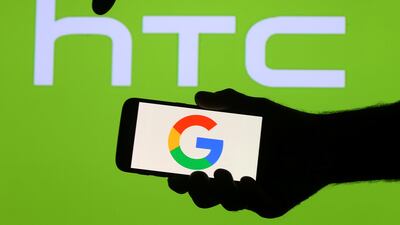Alphabet's Google said it will pay US$1.1 billion to acquire part of Taiwanese HTC Corporation's engineering and design team that worked on the Pixel smartphones, a move aimed at boosting the search leader's phone hardware business and boosting revenues.
Google, in an all-cash deal, will take on some 2,000 employees from HTC, roughly a fifth of the Taiwanese company's total workforce. Many of the newly acquired talent has already been working with Google, the firms said in a joint statement.
The definitive agreement, which includes Google acquiring a non-exclusive licence for HTC intellectual property (IP), follows a decade-long strategic relationship between the companies around the development of premium smartphones.
"This agreement is a brilliant next step in our long-standing partnership, enabling Google to supercharge their hardware business," said Cher Wang, chairwoman and chief executive of HTC. "Our unmatched smartphone value chain, including our IP portfolio, and world-class talent and system integration capabilities, have supported Google in bolstering the Android market."
_________________
Read more:
Google enters India's mobile payments arena
_________________
Google has not acquired assets from HTC, but the announcement underlines its ambitions to make a push into the smartphone hardware market at a time when its rival Apple is commanding attention with new products. Google's Pixel devices intend to include the best features of the Android software that already powers most of the world's smartphones.
Google will continue to have access to HTC's IP to support the Pixel smartphone family, according to the statement, which noted that the agreement represents a significant investment by Google in Taiwan as a key innovation and technology hub.
"HTC has been a long-time partner of Google and has created some of the most beautiful, premium devices on the market," said Rick Osterloh, senior vice president of hardware at Google.
The agreement gives Google tighter control over the design and production of the Pixel and other devices that could potentially boost sales. Those gadgets are becoming the pillars of a strategic push to distribute critical software products like its voice-enabled assistant and better compete with Apple.
The search major is preparing to unveil a second generation of devices next month, building on a portfolio that runs the gamut from Google Home speakers to Daydream virtual reality headsets, according to Bloomberg.
"The end game here is more flexibility on hardware innovation, which can spur incremental revenue through services enabled by those innovations," said Jitendra Waral, a senior analyst with Bloomberg Intelligence told the news agency. "Google essentially gets more control over its hardware design, it can help them accelerate innovation with its own products and use that as the benchmark for the Android ecosystem to follow."


